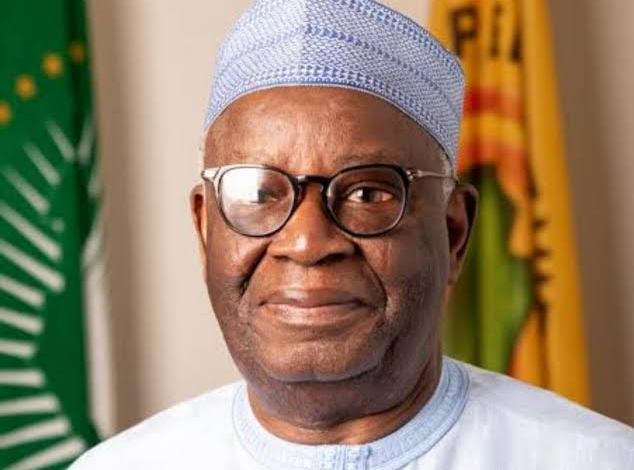The position of Nigeria’s Chief of Staff has been relatively unpopular prior to the appointment of the Late Abba Kyari by President Muhammadu Buhari in 2015.

The position since then has garnered lots of attention thanks to the many controversies that rocked the tenure of the deceased CoS. After the death of Abba Kyari, there have been varying speculations about who would hold the position. It is however presumed that the President would prefer a close -very familiar- ally for the job. The selection of Prof. Ibrahim Agboola Gambari thus suits the presumption.
WHO IS PROF. IBRAHIM GAMBARI
Prof. Ibrahim Agboola Gambari, a native of Ilorin, Kwara state was born on November 24, 1944 to a Fulani ruling class.

He attended King’s College, Lagos for his secondary education and subsequently attended the London School of Economics where he obtained his Bachelor’s degree in Economics with specialisation in International Relations.
He picked up a career in teaching, which he began in 1969 at City University of New York before working at University of Albany.
Afterwards, he taught at Ahmadu Bello University, in Zaria, Kaduna State, the second largest university in Africa.
Mr Gambari later obtained his M.A. (1970) and Ph. D. (1974) degrees from Columbia University, New York, USA in Political Science /International Relations.
Also, between 1986 and 1989, he was a visiting Professor at three universities in Washington, D.C.: Johns Hopkins School of Advanced International Studies, Georgetown University and Howard University.
Mr Gambari was a research fellow at the Brookings Institution also in Washington D.C. and a Resident Scholar at the Bellagio Study and Conference Center, the Rockefeller Foundation-run center in Italy.
Prof Gambari was appointed Nigerian Ambassador to the United Nations, where he held sway for nine years from 1990 to 1999. In 1999, he became President, United Nations’ Children’s Fund (UNICEF) . He was Under-Secretary-General of the United Nations and Special Adviser on Africa from 1999 to 2005 and Under-Secretary-General of the United Nations for Political Affairs from 2005 to 2007.
Gambari is a blue blood of Ilorin Emirate of the Fulani ruling class family. His nephew, Ibrahim Sulu Gambari, is the Emir of Illorin.
His Diplomatic career as the Minister for External Affairs between 1984 and 1985 under General Buhari’s military regime and his sojourn as Nigeria’s longest serving ambassador, made him to serve under five Heads of State and Presidents.
Prof Gambari is the co-chair of the Albright-Gambari Commission and member of the Johns Hopkins University’s Society of Scholars. He was decorated with the title of Commander of the Federal Republic (CFR) by the Government of Nigeria and accorded, honoris causa, the title of Doctor of Humane Letters (D.Hum.Litt.) from the University of Bridgeport. On March 4, 2013, Gambari was named by the then Governor of Kwara Abdulfatah Ahmad as the Chancellor of the Kwara State University.
CONTROVERSIES
As one who served during the ‘dark days’ of the military regime, it wouldn’t be totally correct to say that Prof. Gambari was against some of the evils being perpetrated. One of the biggest of such is his support of the extra-judicial execution of Ken Saro-Wiwa and other members of the Ogoni 9.
In describing the newly appointed CoS role in the Abacha regime, SaharaReporters publisher, Omoyele Sowore said:
If the Abacha repressive regime were a soccer team, Professor Ibrahim Gambari would be one of the “1st eleven players” or at least a quarter back on the reserve bench in the government squad.
Prof. Gambari was Nigeria’s ambassador to the United Nation during the Abacha regime. This alone speaks volume of the ‘responsibilities’ he shouldered. The rhetoric employed in defending the Abacha regime across the world may be tagged ‘diplomacy’ but many would prefer to call it ‘lies’. Tope Oriola writes that “If his performance as Nigeria’s ambassador to the UN during the Abacha regime is any indication, Gambari will hear no evil, see no evil and therefore in all likelihood defend all evils. Consequently, given the character of state and society we have built, Gambari is eminently qualified for the job.”
Asides the ‘official questions’ about Prof. Gambari, a former Nigerian Ambassador, Olusola Fafowora, in his book “LEST I FORGET; Memoirs of a Nigerian Career Diplomat” was critical of Gambari’s character. He detailed how he ‘brought’ the new CoS to the United Nations and how he was eventually backstabbed by him (Prof. Gambari). Explaining one of his encounters with Prof. Gambari, the author said:
He was at the UN in New York with me. I gave him and his wife my city apartment which I was not using free for 3 months plus a car. I liked him and I was not seeking any favours from him.
After 3 months he returned home and sent me a note thanking me for giving him the first opportunity to visit the UN as a delegate and giving him his first experience at multilateral diplomacy.
However, he sent President Shagari a secret and private note that while he was at the UN he observed that I had not been attending the meeting of Islamic states at the UN.
I was shocked that someone I had helped so much turned round to betray me so blatantly. I did not tell him I knew about the secret letter he had sent to the UN. When Shagari was overthrown by Buhari Gambari became Foreign Minister”
Although some lawyers have argued against the constitutionality of the position of the Chief of Staff, it has grown to become one that wields a lot of powers. Such powers definitely comes with more controversies. With the appointment of one who has defended the worst actions of the military regime in times past, Prof. Ibrahim Gambari’s tenure as the chief of Staff may not be alien to controversies.

